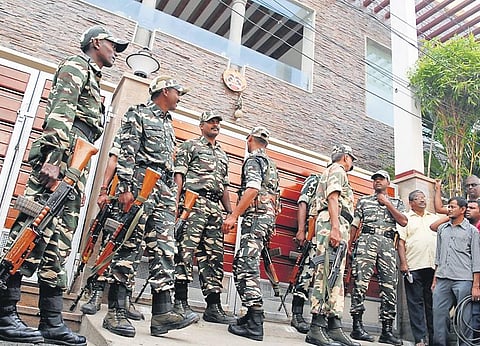CRPF, the brawn behind ED’s widening circle of raids
The hitherto less-known Enforcement Directorate (ED) is now in the news every day. As I write this, the ED is raiding 15 different locations in Telangana. The directorate’s role is to investigate money laundering and violations of foreign exchange laws. Of late, it has emerged as an effective tool of the Union government against corruption in general, as the gamut of this scourge is not merely confined to petty corruption but huge transactions that are used in laundering money and syphoning it off to tax havens. The magnitude of the malice is becoming alarmingly high—more cases are falling under the category of economic offences, and the ED is in a better position to tackle them.
So, like the Central Bureau of Investigation (CBI), the ED is emerging as a major anti-corruption agency under the Indian government. While the CBI basically acts against corruption in government departments, the ED targets the big fries, mostly belonging to political leadership; it so happens that those in the opposition become more vulnerable.
The opposition’s allegations of political witch-hunts notwithstanding, the sight of raids, searches, attachment of properties, and quick arrests of high-profile people are feasts to the eyes of the common man, who is fed up with the corruption in the system. These are at times considered as thrilling as cricket matches. To the common man, the ED men are heroes. But what is not known to many is the fact that the ED has very little back-up. It has to send the arrested accused to the nearest police station lock-up or carry them to Delhi on special planes. Mind you, all offences under the Prevention of Money Laundering Act (2002) are non-bailable, warranting arrest on the spot.
The ED is a rather small organisation under the Union finance ministry, which doesn’t have any back-up security architecture. To add to their troubles, it is often seen that when local political heavyweights are subjected to raids and other follow-up procedures, the local police develop cold feet. That may be the reason why the Central Reserve Police Force (CRPF) is often called upon to secure the raid locations and protect ED personnel on missions. The ED feels more comfortable and confident when the CRPF is around.
Long association with state police organisations, exposure to the intricacies of different law-and-order contingencies, and insulation from political pressure make the CRPF the most sought-after force to deal with such situations. The same cannot be said about local police. I am reminded of what a young superintendent of police (SP) told me once: “I have Congress police and Communist police under me, but not the SP’s police.” Unionism in state police forces has led to the open flaunting of allegiances to various political parties. Trusting them with confidential details of operations is fraught with risk.
The ED is often in action at multiple locations, requiring the simultaneous deployment of a large number of personnel to ensure safety, security and unhindered searches and confiscations. The CRPF—trained and conditioned for movement at short notice to different parts of the country—with its mastery in handling a variety of duties, becomes the first choice.
The ED’s raids and searches are planned and executed with utmost confidentiality. Follow-up actions are immediate, such as recoveries, confiscations and arrests. Imagine all these going on in as many as 20-odd locations in different parts of the country. Only an organisation such as the CRPF, with an all-India network of support systems, can provide the required backup effectively. Its diverse composition and core competency developed over a period of time, apart from its apolitical professional history, are added advantages.
Vallabhbhai Patel would have been happy that the force he saved from being disbanded due to its colonial legacy as the Crown Representative Police is proving to be a force for all seasons. From counter-insurgency to anti-terrorism and from riot control to anti-Naxalite operations, this versatile force with its highly flexible operating procedures is making rapid strides in tackling the ever-dynamic and expanding shades of the nation’s internal security. Mind you, the iron man’s voice was the lone voice for the retention of this central police against all others in the cabinet. And its soldiers to this day carry on in the spirit of ‘We are not to ask why but to do and die’.
But with the economy doing well and the tax regime being what it is, economic offences are going to be on the rise. What we see today is only the tip of the iceberg. Anti-national elements are using hawala and other illegal money transfers to keep their coffers filled. Some greedy politicians are shamelessly amassing wealth under the pretext of party funding, and the quantum involved is going to be higher against the backdrop of improving economic activities. The ED may need its own dedicated armed wing and other security architecture as the classified offences falling within the purview of its mandated tasks are no less than thuggery—ever increasing in scope and spread.
K V Madhusudhanan
Former Inspector General, North Eastern Sector of the CRPF

